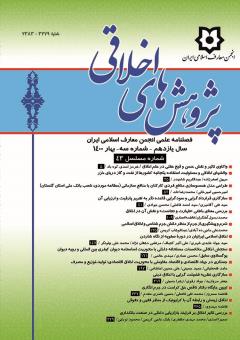سازگاری نظریه فضیلت گرایی با اخلاق دینی
محورهای موضوعی : اخلاق و تربیت اسلامیجعفر مروارید 1 , جواد رقوی 2 , زهرا حسینی 3
1 - دانشگاه فردوسی مشهد
2 - عضوهیئت علمی جامعه المصطفی
3 - مدیر مدرسه علمیهامالائمه(س) تحت اشراف جامعه المصطفی
کلید واژه: نظریه فضیلت گرایی, فضیلت, سعادت, اخلاق دینی,
چکیده مقاله :
مسئلۀ مهم مطرح شده دراین پژوهش این است که اخلاق فضیلت میتواند بهترین وسازگارترین تبیین ازاخلاق دینی باشد. برای رسیدن به این مسئله ابتدا نظریه های اخلاق هنجاری -وظیفه گرایی وغایت گرایی وفضیلت گرایی- تبیین ومقایسه ی بین آن ها انجام می گردد. برتری نظریه فضیلت نسبت به دونظریه رقیب آشکاروپس ازتبیین اخلاق فضیلت محور، هریک مولفه های اصلی آن از قبیل: فضیلت، سعادت، نیت، حکمت عملی، الگوی اخلاقی وحدوسط بیان می-گردد. درادامه برخی مولفه های اخلاق دینی-ازقبیل خداباوری ومعادباوری، پرورش ملکات درونی وخودسازی، جایگاه الگوی اخلاقی دراخلاق دینی، نقش نیت دراخلاق دینی، حدوسط صراط مستقیم یا راه نجات و.... بررسی می شود. همچنین با توجه به قرابت ووحدت موضوع وغایت اخلاق فضیلت واخلاق دینی - به ترتیب علم نفس وسعادت _می توان نتیجه گرفت که اخلاق فضیلت واخلاق دینی نگاهشان به فاعل اخلاقی تکاملی وتعالی بخش است. و نیز می توان با رنگ دینی و جهت الهی دادن به غایت یعنی سعادت دراخلاق فضیلت، زمینه سازگاری این دو اخلاق را فراهم نمود.
The important issue raised in this study is that the ethics of virtue can be the best and most consistent explanation of religious ethics. To achieve this, first the theories of normative ethics deontological ethics and purposefulness and virtue - are explained and compared. The superiority of the theory of virtue over the two clearly competing theories is explained by the explanation of virtue-based ethics, each of its main components such as: virtue, happiness, intention, practical wisdom, moral model and middle ground. In continuation, some components of religious ethics - such as theism and resurrection, cultivation of inner property and self-improvement, the position of moral model in religious ethics, the role of intention in religious ethics, the middle of the straight path or the way of salvation, etc. - are examined. Also, considering the closeness of the subject and the end of morality of virtue and religious morality - in the order of self-knowledge and happiness - it can be concluded that their morality of virtue and religious morality is their view of evolutionary and transcendent moral agent. It is also possible to provide the ground for the compatibility of these two morals with religious color and divine direction to the end - happiness - in the morality of virtue.
